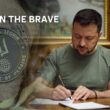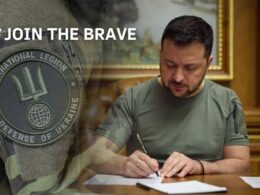On his 18th birthday, Mykyta went to the Military Personnel Office. The young man was excited. He held tight a stack of documents. A week later he packed his things and went to serve in the military.
In the army, he received the nom de guerre Zinger because he always smiled and encouraged everyone. He signed a contract with the marines of the Ukrainian Armed Forces in a few months. It was the end of 2021.
The newly-minted soldier celebrated the New Year Eve in the trenches. There were no fireworks right away. But he did hear his first explosions instead when part of his unit was sent to Mariupol in the wake of Russia’s full-scale invasion on February 24.
At the end of April, his besieged 36th Marine Brigade was breaking through as they were leaving the “Illich” metallurgical plant. But Zinger’s group did not make it with the main force.
The Ministry of Defense listed Zinger and his brothers in arms as missing persons. However, his mother recognized him on a video of a column of prisoners on Russia’s Union TV channel. Journalists of the aggressor country filmed Ukrainian soldiers convoyed to vehicles. Despair and joy overwhelmed her. What to do, who to tell, and how to bring her son home?
The story of one of the youngest fighters is told by his mother, his fellow soldiers and the civilians he saved. Also, lawyer Andriy Novak explains what to do if one’s relative was captured.
He got his nom de guerre for his cheerful life attitude
Mykyta Tatyanko was an ordinary boy with a lot of heart and a lot of corners. He attended a young army movement club in his native Zaporizhzhia.
“As a child, he was a little chubby. So, he fought child’s “extra kilos” by doing judo, hand-to-hand combat, basketball, boxing, and self-defense. He was winning too. His coaches said that he had good physical prerequisites. He was soul searching however,” – says his mother Larisa.
His school described him as a capable boy but “listless out of proportion.”
He entered a community college to become a sailor welder but he dropped out because of a conflict with the foreman. Then Mykyta finally decided to join the army.
The boy chose the airborne assault course in Mykolaiv, the most interesting classes were in tactical medicine. He asked a lot and was eager for information on how to save human life.

On Larisa’s birthday at the end of January, her son called from the trench. His platoon was in Shiroki, Donetsk Region, on the so-called zero line across the pro-Russian separatists. But this did not prevent the boy from sending his mother with a bouquet of roses. She recounts this memory with particular warmth:
“He calls me and says: ‘Mom, don’t go to bed yet.’ After a while, she heard a buzz on the intercom. The voice announced a courier with a parcel. I was scared. My son is in the military man. What if it’s something bad… And here there was a courier with a bouquet and a postcard ‘For my mom on her birthday’.
He also sent a video greeting. He showed the trench, and then introduced Larisa to his machine gun. He named him after me, so that he would not let him down and would take care of it with pleasure.”
The mother spoke very warmly about her son. She also mentioned the quarrels. Things happen. Larisa said that a few years ago, teenager Mykyta began stopping quarrels and talking back with a smile and courtesy words.
“He is very charismatic and kind. His smile is disarming. He always smiles when he tells a story. That’s why his nickname is Zinger,” the woman says with a smile.
After 4 long days, they wrote that he was in captivity
When Mykyta was transferred to Mariupol, he asked his mother to apply for a travel passport to leave her home at the first signs of danger and to go at least to the west of the country.
Later, when they were surrounded, he said: “Mom, I saw a lot in Mariupol. And I really want you to live. The news doesn’t show even 10% of all the horrors. The trap can close quickly. You won’t even have time to realize it. Don’t think about me. I knew where I was going.”
Larisa cried but she was helpless.

Mykyta called home once every 4 to 5 days, because there was only one point in the city where he could get a connection. He had to run several blocks to get there.
“I understood that he was taking a risk when he ran to call me but my mother’s heart still asked me to send messages more often,” says Larisa.
When the mother heard her son’s voice for the last time, she felt in her heart that something bad was about to happen. He asked how she was doing and then immediately said that he loved her very much.
“I tensed up and asked what happened. He said, ‘It’s nothing, I just love you so much, you can’t imagine.'”
Mykyta continued: “I know I’m needed here. I don’t regret. I chose this path myself. I’m asking only for one thing: that you live and save my sister. So that both of you live! I came here only for your sake. So that we don’t have a war. I don’t know if I’ve done a lot but I tried as much as I could,” the woman recounts the dialogue with her son.
Then Larisa began to ask Mykyta to promise to return. But he replied that he was not to because there was hell there.
Mykyta’s desire to help with the family’s financial issues was one of the reasons for his decision to sign a contract with the Armed Forces. His father died of cancer two years ago, after long and expensive treatment.
“I don’t need that money, I say, the main thing is that you live. The son replied that it’s not up to him. And then I heard explosions, and the phone turned off,” the woman recounts.
Then there was a week of silence. Then a message from an unknown number suddenly arrived on WhatsApp: “Mom, I’m alive and well, your eaglet Zinger.”
And two photos. She replied that she loved him too. The message was read, but there was no reply.
The mother deleted all correspondence for security, but left this unknown number.
“For a week, I wrote to that number, asking that if anything is known about my son, to provide me with information. After 4 long days, I received a letter that he was in captivity,” says Larisa.
The mother began to look for confirmation. She did not sleep for several days. Her eyes were red and sore because the woman did not move away from the screen. In one of the videos, where the soldiers were surrendering in Mariupol, she saw a guy who looked like her son.
Larisa was contacted by people who promised that Mykyta would call her when they got out of hell.
He saved a woman from suicide
Ksenia met Zinger on the day when a residential quarter of Mariupol was shelled. Her relatives were injured and died that day.
A young military man helped the woman to stand up morally. So, when she escaped to the territory under the control of Ukraine, she began to look for a young marine on social networks. A few days after Ksenia published the post, Mykyta’s mother wrote to her, informing that he was in captivity.
On March 12, residential quarters of Mariupol were hit with Grad MLRS. She was hiding in an apartment with her family, but a shell hit the building. Her 16-year-old son and her sister’s husband died instantly. Ksenia herself as well as her mother, niece, sister and were injured.
“They all had critical bleeding, I had a relatively minor injury and a shell shock,” the woman said.
When the shelling died down, a neighbor came by to make sure Ksenia was okay. The man’s car survived miraculously, and so he took them all to children’s traumatology. It was the only hospital under the control of Ukraine and it was still working.
“When we just arrived, the strap on my mother’s leg had already loosened. A military man (it was Mykyta) came up to us and tightened the improvised tourniquet made from a belt. This saved my mother,” the woman continues.

All of Ksenia’s relatives were immediately taken to the operation. She waited for her turn. There were many patients that day.
“I was in a state of shock: I wanted to commit suicide, because half of my family died in front of me, and it wais not known whether the other half would survive.
I really wanted to smoke a cigarette. I didn’t have it, because it was a shortage. I saw a military man in the hospital lobby. It was Mykyta. He carried a box with “goodies” for children – books, pencils, coloring books. I approached him and asked for a cigarette,” the resident of Mariupol recalls.
He finished handing out gifts for the sick children and said: “Let’s go out.”
The main door to the hospital was huge. It was made of iron, but it could not be opened because of the shelling. Since the beginning of March, shelling was continual. So, Zinger and Ksenia opened the door crack.
“We started smoking. Mykyta was behaving so strangely – sometimes he would stand sideways to me, then somehow he would come very close. I didn’t immediately understand why. He was covering me with his armor jacket,” Ksenia shares her memory.
Between puffs, he asked what happened, and Ksenia told him briefly.
“Mykyta looked at me carefully and said: ‘Look at how many wounded people are there. We have to help people. You can’t do anything bad to yourself.’ I hadn’t told him about my intention but he figured it out.
And for sure, I would ignore all his “instructions”, but he reminded me of my son. And then he shook his shoulders and said: “You are needed here, go help,” – Ksenia’s voice was full of gratitude.
She approached the doctors, asked about the condition of her relatives and about what she could do to help. Doctors said that there was a critical shortage of staff – some nurses and paramedics did not go to work or finished their shift but did not return. No one knew if they were alive. So, she decided to help at the hospital: she washed the floor and was putting bandages for 4 days.
At night, 2 soldiers always stayed in the hospital to guard civilians.
“I was very afraid to sleep in the ward, so I asked Mykyta to bring a mattress and leave it in the corridor where there were no windows. Shelling at night is not just loud. It’s a combined light and sound “show.” He came by several times and asked me how I was. A new shift of soldiers arrived in the morning.
I saw him one more time, in a blink of an eye, when he was carrying bottles of saline solution that were still available at the place of their dislocation. Mykyta ran by. I didn’t even have time to talk to him again,” she adds.
The only thing after which his mood fell was two hundred
Marik (name changed), a doctor who operated and rescued the wounded in Mariupol, met Mykyta in the hospital.
“He was part of the military personnel guarding the hospital in the burning Mariupol. Mykyta was the first to run to help the wounded when the Russian aircraft attacked the maternity hospital.
In the hospital, he helped with transportation and transfer of the wounded, and all other hard work. ‘I helped to bring the fallen into the basement during shelling, cover the windows with bags, etc.” Marik says.
In the rare breaks between bringing in the wounded, they went out for smoke breaks and talked about life. Mykyta asked a lot of questions about how to help the wounded, about various diseases and conditions. He said that he was so interested in all medical topics that he would like to become a doctor after the war.

Mykyta helps the wounded in Mariupol. Screenshot from the news video
“He never lost his temper after artillery or airstrikes. He smiled and joked. The only thing that made his mood drop was the dead. He kept asking what else could be done to increase survaval chances,” the doctor recalls.
The last time Marik and Zinger spoke was the day after the Russians bombed the military hospital.
Mykyta said then that the medics should leave the hospital. They were civilians, and so, they had a chance not to be killed or taken POW. When asked what he would do as a soldier, he answered: “I am a serviceman. I will stand to the end.” Zinger sent around his mother’s phone number.
“He asked to call her as soon as I got out, and to tell her that he was not afraid and was brave, and that he loved her. I got out only in a month.
I called her on the first day. I learned from her that she had seen him in Russian propaganda videos but it was not certain if it was him. I recognized him and confirmed,” the doctor notes bitterly.
Marik added that through third parties in the occupied territories, the mother learned that the conditions of POWs were terrible. 20 people were kept in a cell for two with food only once a day and minimal water. The health of the prisoners of war was bad. They were not taken outside to breathe, and unsanitary conditions were terrible.
Gratitude for the right upbringing of the son
Larisa was also contacted by one of the guys who was in the local Territorial Defense unit and led hospital security in Mariupol downtown.
“Good afternoon. I want to express my sincere thanks for raising your son Mykyta. I had the honor of being with him during our work in the wards of Mariupol city hospital #3.
I am so grateful to God that I had the privilege of meeting him. He was also worried about you. There was no connection, and he couldn’t say that everything was fine with him and how much he loved you. Thank you once again for such a proper upbringing of your son,” he wrote.
Mykyta told Larisa in a private conversation that he was getting a ration for the day in Mariupol, and he shared his can of stew with people.
The man tried to explain to him that people were selfish, and they might have plenty to eat, but you’d starve. But Mykyta remained unwavering.
His answer greatly impressed the guard: “Maybe she has 10 hungry mouths at home? I’ll get her something.”
“That’s my son – he’ill give away his last shirt. According to his brothers in arms, he’d do the same with his military first-aid kits if necessary,” says Larisa.
However, she was most impressed that this man thanked her for raising Mykyta.
“First of all, I am a mother. I was proud of my son when he passed the casting for a movie. I was proud when he took 2nd place in the region in self-defense. And I was very proud when all other children were playing outside during summer holidays, but Mykyta worked every summer from the age of 13.
And now I know my son’s other side. Whatever his fellow servicemen tell me… I didn’t think that my son would have done such things. I am even more proud of him now! It seemed that I didn’t even know him,” says Mykyta’s mother.
For the Ministry of Defense, he is missing, not a POW
When Larisa found confirmation that her son was in captivity, she went to the military personnel office. She said she couldn’t enter the building but got the phone numbers of the commanders and sections that dealt with POWs. In addition, she called the hotlines, but these institutions did not even provide confirmation of receipt of personal data.
The military personnel office keeps records of all military personnel, explains Andriy Novak, lawyer of the Miller law firm. Therefore, it should notify about the dead, missing, captured or taken hostage no later than in 7 days.
A screenshot where the mother saw her son
“There is no legislative act on how to transfer a person from the list of missing persons to the list of prisoners in Ukraine for civilians. There is only a rule of the Ministry of Defense and the Ministry of Internal Affairs regarding the organization of personnel accounting. But these documents concern only internal processes,” he adds.
The relatives of the missing and prisoners can contact the unit, the personnel office, the hotlines of the Ministry of Defense and the Ministry of Internal Affairs, the Joint Center for the Search and Release of Prisoners, and the Red Cross. “All these structures are parallel, so it is advisable to contact and send information to all these institutions, including screenshot from the video where the prisoners are taken out, the media where the Russians mention the name, or an audio recording of the call,” the lawyer explains.
The Russians must confirm the list of military personnel who are in captivity but unfortunately, they do not include everyone there, and it is impossible to influence this. The Ministry of Defense cannot grant them such status until the representatives of the aggressor country confirm that Zinger and other soldiers have surrendered.
“The Red Cross does not have any legal authority to exchange prisoners. But they should monitor the conditions and treatment of them. Red Cross volunteers can cooperate with state authorities and accompany the exchange procedures. That is, they act as an independent authority so that there is no manipulation of the number of prisoners of war.” explains Andriy Novak.
Reference: The Ukrainian Pravda








